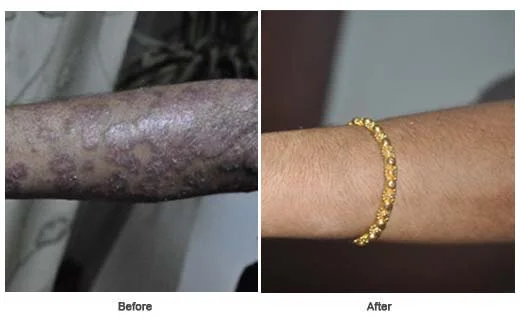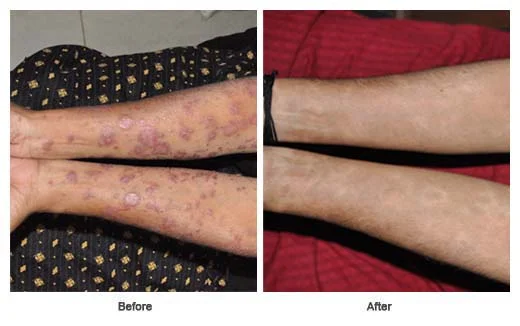Psoriasis is a chronic skin disease characterized by dry skin, red, and scaly patches. It is considered to be an autoimmune disease, meaning that the immune system of the body works against its own tissues. Although it is a non-infectious condition, it can have a negative impact on certain organs of the body.

Causes
Psoriasis is commonly considered an autoimmune disease. Factors including heredity, lifestyle changes, environmental factors, exposure to certain medications, stress, or a combination of these may trigger the condition. In Ayurveda, different types of psoriasis are correlated to certain Kushta conditions mentioned in classics. Since these vary in dosha involvement, treatment protocols also differ from patient to patient. Conditions such as Sidhma, Dadru, Ekakushta, Kitibham, Charmadala, Vipadika etc. are described in Ayurveda and reflect features of different stages or types of psoriasis.
Symptoms
Symptoms associated with the disease are:
- Thickened, raised, and scaly skin
- Reddish patches
- Dry, cracked skin that may bleed
- Inflammation of joints with pain
- Pitting, whitening, or discoloration of nails
- Types
There are different types of psoriasis which are as follows:
- Plaque Psoriasis – reddish, raised skin with silver scales
- Psoriatic Arthritis – inflammation of joints
- Guttate Psoriasis – small red spots on the skin
- Pustular Psoriasis – white pustules on skin
- Inverse Psoriasis – smooth red lesions
- Erythrodermic Psoriasis – widespread redness and itching
Treatments
Ayurveda is considered one of the best options for managing psoriasis as it is natural and free from side effects. From an Ayurvedic perspective, psoriasis is caused by the vitiation of ata, Kapha, Rakta and accumulation of toxins in the blood. Panchakarma is the preferred treatment method as it helps in eliminating toxins and purifying the blood. The therapies include:
- Vamana
- Virechana
- Vasti
- Raktamokshana
- Nasya
Apart from these, supportive therapies may include:
- Powder massage (Udwartana)
- Application of ointments (Lepanam)
- Intake of medicated ghee (Snehapanam)
- Oil massage (Abhyangam)
- Medicated steam bath (Avisnanam)
- Retaining oil on head (Sirovasti)
- Dripping medicated buttermilk (Dhara)
Ayurvedic treatment requires time which brings about perfect results. As such we need to be patient and have faith in the medications.


(Results may vary from person to person) View More